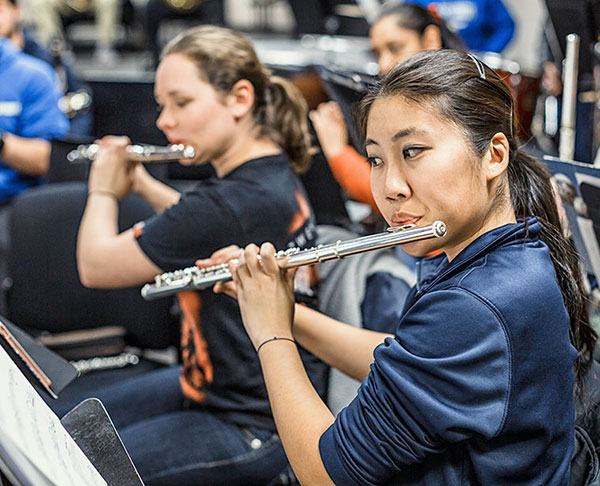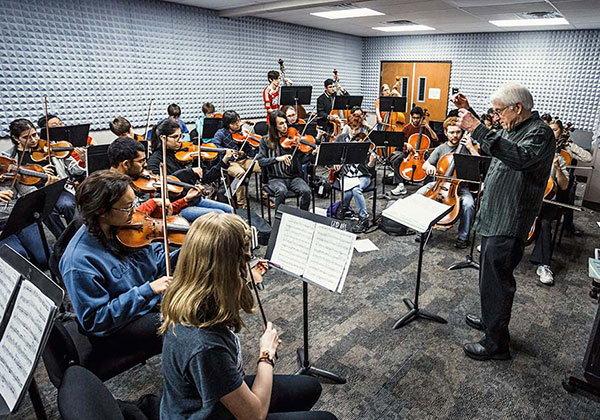
Heather Hansen (left) and Monica Lou are flutists for the Wind Ensemble and University Orchestra. They also participate in small ensembles, some of which play at retirement homes to enthusiastic audiences.
In the minutes leading up to 7 p.m. the air is full of the scuffing of chairs across carpet, the metal scraping as music stands are unfolded, and the shuffling of sheet music being passed through the ranks. Two students wheel a pair of double basses from a back closet stuffed with instruments in black cases. Reeds are wetted and affixed to mouthpieces, and a chorus of metallic clicking accompanies the limbering of both fingers and keys. Bows are tested against strings as the players tuck violins against their cheeks. The students of the UT Dallas Wind Ensemble and String Orchestra, though they meet in different rooms, enact this ritual every week in order to prepare for rehearsal.
One Night, One Purpose
The orchestral ensembles are designed to enable all interested students, whatever their major, to integrate music performance into their education. Other performance opportunities include Vocal Ensembles, Jazz and Classical Guitar. The Advanced Chamber Music Ensemble, conducted by world-renowned composer Dr. Robert Xavier Rodríguez, professor of music and Chair in Art and Aesthetic Studies at UT Dallas, performs each semester as Musica Nova.
Director Gregory Hustis knows requiring anyone to stay in class until 9:45 p.m. is a big ask.
“Tuesday nights are simply the best and most realistic option,” Hustis said. “We schedule around tests, classes and any other thing. We will do anything to help facilitate the students, regardless of what they want to do.”
Hustis first spends the evenings at the head of the Wind Ensemble, then a combined full orchestra. He waves a pencil when a baton is not readily available, and he fixes his players with a characteristic down-the-nose stare when they play off-key or run wild with the tempo. The students appreciate his candor.
“He’s a better director than I’ve had in the past,” said Heather Hansen, a biochemistry sophomore and flute player. “He treats us like adults, and that makes the environment more mature and relaxed.”
That mutual respect is the product of understanding what he and Dr. Linda Salisbury, assistant director, expect from their players: Show up and do your best.
“Everyone is there because they want to be there and they love music,” said Hollee Ratliff, a neuroscience sophomore and violin player. “It’s a passion.”
The students fill the halls with music for other reasons, too. Most of them said playing helps their lives beyond the realm of time signatures and key changes.
“Being in a music program helps me with time management and responsibility,” said Samantha Alleman, an accounting sophomore and viola player. “You come to understand what your part is and balancing it with other people.”
Hansen met her best friends and boyfriend through music. She is grateful the class allows her to keep music performance in her life. She also plays her flute to relieve stress while in the deep end of heavy classwork.
“I had an [organic chemistry] test on Wednesday, so during the weekend I was studying. I had gotten stuck and lost motivation,” she said. “But then I took a practice break for about an hour. When I came back I was completely refreshed, didn’t have that block and could continue studying.”
Monica Lou, a biology junior and McDermott Scholar, pursues a mental equilibrium through music performance.
“Though research and science do entail creativity, much of the day-to-day work involved following detailed protocols and performing repetitive actions,” Lou said. “However, playing the flute is uniquely empowering in that I know that any small change I make will have a clearly audible effect.”
Music for All Students
The orchestra class has been around at UT Dallas for 10 years, half of that time under the stewardship of Hustis and Salisbury. In that time, the number of students enrolled has grown each semester.
Salisbury collects data showing the representation of different departments within the orchestra. The largest contributor is the Erik Jonsson School of Engineering and Computer Science with 45 percent, followed by the School of Natural Sciences and Mathematics at 14 percent, and both the School of Behavioral and Brain Sciences and the School of Arts, Technology, and Emerging Communication at 11 percent.
Dr. Dennis M. Kratz, dean of the School of Arts and Humanities, commends the students for the commitment and intensity they put into the orchestra and ensemble.
“While the students are rehearsing, they are concentrating at maximum capacity — both creatively and physically,” said Kratz, the Ignacy and Celina Rockover Professor of Humanities. “There is a growing body of evidence that participation in music classes enhances both the cognitive and imaginative abilities of students.”
Alleman, who joined the orchestra as a freshman, is also a leader with Comet Symphonique. The club is composed of band and orchestra members who raise funds to host social events and mixers for musicians.
At the end of each semester, the ensembles and orchestras gather in the University Theatre to perform pieces months in preparation.
“These students are busy people, and they don’t give up their time lightly,” Hustis said.
Students can also benefit from collaborating on musical arrangements. All of the students agreed that it takes more than rote participation for the pieces to come together — everyone contributes no matter their skill level.
“Do the Tuesday night rehearsals enhance the education of these students? Recently the parents of a graduating senior — a biochemistry major — wrote that their daughter’s ability to participate in the string and full orchestras during her academic career at UT Dallas has allowed her a rounded and truly enriched education,” Kratz said.
At UT Dallas, the creative arts are for everyone.
